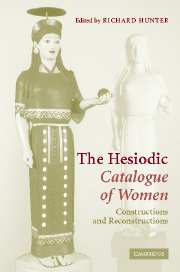Book contents
- Frontmatter
- Contents
- Notes on contributors
- Acknowledgements
- List of abbreviations
- Introduction
- 1 Ordering women in Hesiod's Catalogue
- 2 The beginning and end of the Catalogue of Women and its relation to Hesiod
- 3 Gods among men? The social and political dynamics of the Hesiodic Catalogue of Women
- 4 Heracles in the Hesiodic Catalogue of Women
- 5 Mestra at Athens: Hesiod fr. 43 and the poetics of panhellenism
- 6 A catalogue within a catalogue: Helen's suitors in the Hesiodic Catalogue of Women (frr. 196–204)
- 7 Pulp epic: the Catalogue and the Shield
- 8 The Megalai Ehoiai: a survey of the fragments
- 9 Ordered from the Catalogue: Pindar, Bacchylides, and Hesiodic genealogical poetry
- 10 The Hesiodic Catalogue and Hellenistic poetry
- 11 From genealogy to Catalogue: the Hellenistic adaptation of the Hesiodic catalogue form
- 12 The Hesiodic Catalogue of Women and Latin poetry
- 13 Or such as Ovid's Metamorphoses …
- Bibliography
- Index of passages discussed
- General index
5 - Mestra at Athens: Hesiod fr. 43 and the poetics of panhellenism
Published online by Cambridge University Press: 22 September 2009
- Frontmatter
- Contents
- Notes on contributors
- Acknowledgements
- List of abbreviations
- Introduction
- 1 Ordering women in Hesiod's Catalogue
- 2 The beginning and end of the Catalogue of Women and its relation to Hesiod
- 3 Gods among men? The social and political dynamics of the Hesiodic Catalogue of Women
- 4 Heracles in the Hesiodic Catalogue of Women
- 5 Mestra at Athens: Hesiod fr. 43 and the poetics of panhellenism
- 6 A catalogue within a catalogue: Helen's suitors in the Hesiodic Catalogue of Women (frr. 196–204)
- 7 Pulp epic: the Catalogue and the Shield
- 8 The Megalai Ehoiai: a survey of the fragments
- 9 Ordered from the Catalogue: Pindar, Bacchylides, and Hesiodic genealogical poetry
- 10 The Hesiodic Catalogue and Hellenistic poetry
- 11 From genealogy to Catalogue: the Hellenistic adaptation of the Hesiodic catalogue form
- 12 The Hesiodic Catalogue of Women and Latin poetry
- 13 Or such as Ovid's Metamorphoses …
- Bibliography
- Index of passages discussed
- General index
Summary
INTRODUCTION: PANHELLENIC POETICS
The genealogical poetry, of which the Catalogue is one example, must have evolved over many centuries, and it seems likely that it is at least as old, if not older than, epic narrative poetry. Or perhaps we should think of two parallel traditions: narrative poetry, focusing on the deeds of men, the κλέα ἀνδρῶν, and genealogical poetry, presented as a register of women, who generate the genealogies by giving birth. These two traditions of poetry may influence each other in some ways, as famously in the catalogue of heroines in the Odyssean Nekuia, but in other ways their relationship may be one of competition, as for example in the case of the discrepancies between the accounts of Ajax's kingdom in the Homeric ‘Catalogue of Ships’ and the catalogue of Helen's suitors in the Catalogue. The canonical or quasi-canonical Ehoiai must be the result of a process of evolution that spanned many centuries, and it is likely that this sort of poetry was particularly accommodating of expansions and modifications (cf. Marcotte 1988). For example, any single ehoie could in principle be expanded, as the Hesiodic Aspis purports to be an expansion of the Alcmene-ehoie. Thus, we might do well to think of this sort of poetry as existing in numerous multiforms.
We are beginning to get a better sense of the ways in which the poem dealt with Greek genealogical traditions.
- Type
- Chapter
- Information
- The Hesiodic Catalogue of WomenConstructions and Reconstructions, pp. 99 - 117Publisher: Cambridge University PressPrint publication year: 2005
- 3
- Cited by



